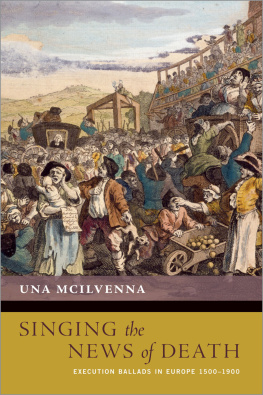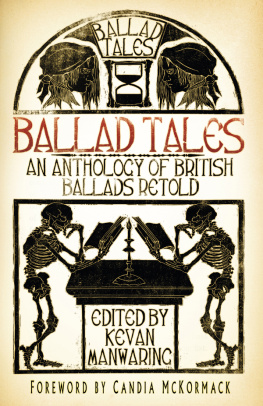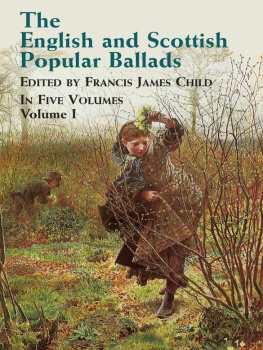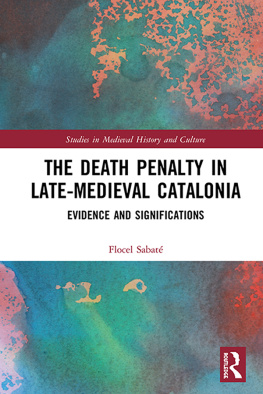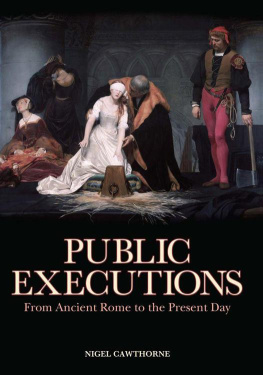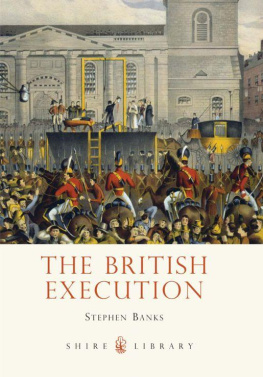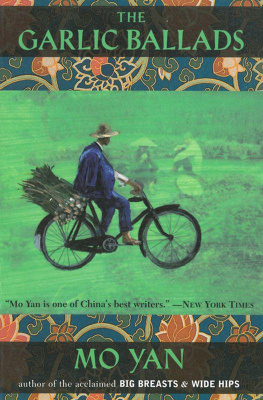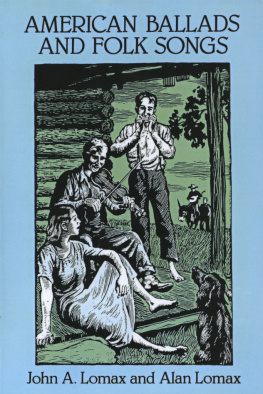Singing the News of Death
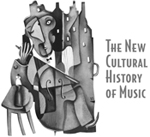
JANE F. FULCHER, Series Editor
Series Board Members:
Celia Applegate
Philip Bohlman
Kate van Orden
Michael P. Steinberg
Enlightenment Orpheus: The Power of Music in Other Worlds
Vanessa Agnew
Voice Lessons: French Mlodie in the Belle Epoque
Katherine Bergeron
Songs, Scribes, and Society: The History and Reception of the Loire Valley Chansonniers
Jane Alden
Harmony and Discord: Music and the Transformation of Russian Cultural Life
Lynn M. Sargeant
Musical Renderings of the Philippine Nation
Christi-Anne Castro
The Sense of Sound: Musical Meaning in France, 12601330
Emma Dillon
Staging the French Revolution: Cultural Politics and the Paris Opera, 17891794
Mark Darlow
Music, Piety, and Propaganda: The Soundscapes of Counter-Reformation Bavaria
Alexander J. Fisher
The Politics of Appropriation: German Romantic Music and the Ancient Greek Legacy
Jason Geary
Defining Deutschtum: Political Ideology, German Identity, and Music-Critical Discourse in Liberal Vienna
David Brodbeck
Materialities: Books, Readers, and the Chanson in Sixteenth-Century Europe
Kate van Orden
Singing the Resurrection: Body, Community, and Belief in Reformation Europe
Erin Lambert
Electronic Inspirations: Technologies of the Cold War Musical Avant-Garde
Jennifer Iverson
Musical Solidarities: Political Action and Music in Late Twentieth-Century Poland
Andrea F. Bohlman
Cultivated by Hand: Amateur Musicians in the Early American Republic
Glenda Goodman
Sounding Feminine: Womens Voices in British Musical Culture, 17801850
David Kennerley
Socialist Laments: Musical Mourning in the German Democratic Republic
Martha Sprigge
Singing the News of Death: Execution Ballads in Europe 15001900
Una McIlvenna

Oxford University Press is a department of the University of Oxford. It furthers the Universitys objective of excellence in research, scholarship, and education by publishing worldwide. Oxford is a registered trade mark of Oxford University Press in the UK and certain other countries.
Published in the United States of America by Oxford University Press
198 Madison Avenue, New York, NY 10016, United States of America.
Oxford University Press 2022
All rights reserved. No part of this publication may be reproduced, stored in a retrieval system, or transmitted, in any form or by any means, without the prior permission in writing of Oxford University Press, or as expressly permitted by law, by license, or under terms agreed with the appropriate reproduction rights organization. Inquiries concerning reproduction outside the scope of the above should be sent to the Rights Department, Oxford University Press, at the address above.
You must not circulate this work in any other form and you must impose this same condition on any acquirer.
Library of Congress Control Number: 2022935149
ISBN 9780197551851
eISBN 9780197551875
DOI: 10.1093/oso/9780197551851.001.0001
I dedicate this book to the memories of those who were, and continue to be, the victims of state-sponsored executions. I hope these songs act as a reminder of their suffering, and I look forward to the day when the immoral death penalty is abolished across the world.
Contents
A book that has taken a decade to research and write, and which involves multiple countries and languages, has, needless to say, benefited from the wisdom and generosity of more people than I can possibly thank here. I am indebted to the tireless researchers at the various ballad digitisation projects: Paddy Fumerton and the team at EBBA, Giles Bergel, Alexandra Franklin and the team at the Bodleian, Maxou Heintzen and the team at Criminocorpus, Martine de Bruin and the team at the Liederenbank, and the many librarians and archivists around the world who, where the ballads were not digitised, simply took photos of them and sent them to me without charge. I have tried to thank them where that work appears in the book. Also, I am grateful to Aurelle Levasseur who took photos for me in Paris, and Edina Eszenyi who took photos in Rome. I also want to thank the helpful staff of so many libraries, small and large, that I visited over this long period: the Bibliothque des Littratures Policires (BiLiPo), the Bibliothque historique de la ville de Paris, the Deutsches Volksliedarchiv in Freiburg, Chethams Library in Manchester, the Bibliothque nationale de France, and the British Library. I discovered some of the ballads about the French Revolution on a Newberry Library Fellowship in 2014; I am grateful for their warm welcome. I also thank the staff of the many libraries and institutions that provided images; as well as those mentioned above, Universittsbibliothek Gttingen, Universitts- und Forschungsbibliothek Erfurt/Gotha, Stadtbibliothek Augsburg, Bayerische Staatsbibliothek, Waddesdon Manor, Schweizerisches Landesmuseum, Zrich, KunstbibliothekStaatliche Museen zu Berlin, and Harvard Law School Library, Historical & Special Collections.
As well as these, there are the song and music scholars who have repeatedly shared their expertise with me. My thanks go to Angela McShane, Chris Marsh, Jenni Hyde, Eva Guillorel, Oskar Cox Jensen, Steve Roud, Tom Cheesman, Rosa Salzberg, Massimo Rospocher, Siv Gril Brandtzg, Juan Gomis Coloma, Jeroen Salman, Rene Vulto, Ccile de Morre, Emilie Murphy, Maxou Heintzen, John Romey, Jessica Herdman, Jeanice Brooks, Nick Hammond, Tom Hamilton, Melanie Marshall, and Roland Brou, to mention only a few.
Scholars of crime and punishment have also shared their wisdom with me: I am so grateful to Pascal Bastien, Paul Friedland, Richard Ward, Joy Wiltenburg, Franois Soyer, Richard Evans, and Frances Dolan. Special thanks must go to the entire team at the Old Bailey Online Project, which has been an essential resource for me and my students.
Julianne Bell was responsible for taking the chaos of my Dropbox folders and making them into the ordered and beautiful Omeka database www.executionballads.com, which now allows the general public to see and hear these songs. My gratitude to her is immense, and to the Digital Studio run by Rachel Fensham who championed this digital initiative throughout. Various talented singers have recorded beautiful versions of these songs, especially Jenni Hyde, Hannah Sullivan, Molly McKew, and Lisa Salvo; you can hear them all on the website. The extraordinary Jenni Hyde also transcribed all of the melodies into modern musical notation, sometimes from nothing more than an audio track, and then provided accurate musicological analyses for each. My gratitude to her knows no bounds.
Several friends generously read sections of this book, for which I am immensely grateful. I would like to thank Jenny Spinks, Paddy Fumerton, Katie Barclay, Briony Nielson, Robin Walz, and Mark Seymour. Any errors that remain are my fault alone.
As an early career academic I relocated intercontinentally multiple times in order to secure jobs. While the current state of the academic job market leaves a lot to be desired, I am so grateful that at each place I was surrounded with dream colleagues, far too numerous to list in full here: at the University of Sydney where this project began; at Queen Mary University of London; at the University of Kent, and at the University of Melbourne.

